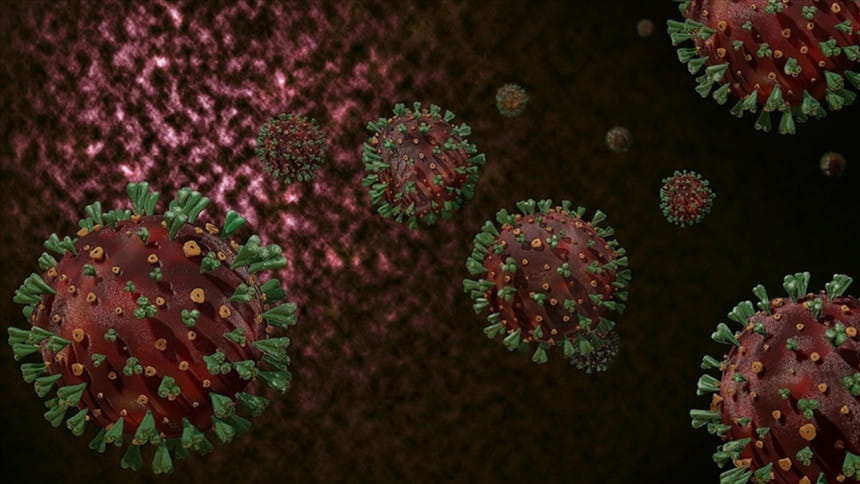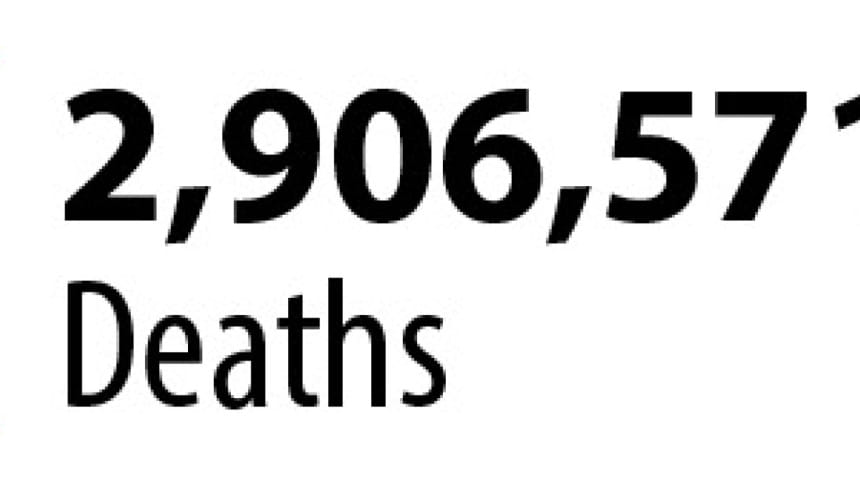Experts View: S African variant spreading widely

Observing the recent surge of coronavirus cases, it was assumed that a new Covid-19 strain had spread in Bangladesh.
The country has direct communication with UK, with hundreds of expatriates coming to Bangladesh every month. In December last year, a new strain of Covid-19 (B117) was detected in the UK.
All these factors led to the assumption that the second wave of coronavirus in Bangladesh was caused by the new UK variant.
But a recent study of icddr,b reveals that the South African variant (B1351) of Covid-19 is dominant in Dhaka. This finding forces a rethink.
The researchers completed genome sequencing of 57 samples in the third of week of March. Of these, they detected the South African variant in 46 cases -- meaning that the South African variant was found in 81 percent of the Covid-19 samples.
On March 21, another organisation -- Child Health Research Foundation (CHRF) -- collected 22 samples. After genome sequencing, the South African Variant was found in 80 percent cases while 10 percent contained the UK variant.
Both findings suggest that the South African variant is spreading across Bangladesh. Perhaps this is the reason behind the recent skyrocketing of coronavirus cases.
Between March 12 and 17, icddr,b sequenced genomes of 99 samples. Of these, 64 samples (65 percent) contained the South African variant and the remaining 12 samples had the UK variant.
But the organisation could not identify any South African variant while conducting variant surveillance among 248 samples between January 1, 2021 and March 11, 2021.
In the first week of January, icddr,b identified the UK variant in only one sample among 52 tested, or two percent. Since the last week of January, the frequency of UK variants among the test samples has been increasing steadily, and it moved up to 52 percent in the first week of March. After the second week of March, the presence of the UK variant suddenly started decreasing and the South African variant started taking its spot.
The question now is: what is the connection between the surge of Covid-19 cases and the emergence of the South African variant?
Both the South African and the UK variants have gone through N501Y mutation within their spike protein, which makes them highly contagious. However, the spike protein of the South African variant has gone through a critical mutation titled E484, which gives it resistance against vaccines and the capability to re-infect easily.
In Bangladesh, the second wave started from the first week of March, but the surge of Covid-19 cases was evident from mid-March. From the last week of March, the number of affected patients increased from 3,000 to 5,000 per day, and in April, the daily numbers reached the 7,000 mark.
During this period, and specifically between 12 March and 24 March, 64 to 80 percent of collected samples were the South African variant. These samples were collected from 13 districts.
The icddr,b collected 751 Covid-positive samples from these 13 districts, and separated 443 samples with increased viral load. It conducted genome sequencing on those separated samples and identified 110 unique South African variants in 156 samples.
One caveat is that considering the total population and the numbers of daily test cases, 443 is not a significant sample size -- it is very difficult to definitively say how much the South African variant has spread.
However, with the trends mentioned above, it is well within the realms of possibility that the South African and UK variants have, or could, spread across Bangladesh, and the presence of these foreign strains are responsible for the recent surge of Covid-19 cases.
HOW EFFECTIVE IS COVISHIELD
AGAINST SOUTH AFRICAN VARIANT?
The phase-3 clinical trial results published in The New England Journal for Medicine on March 16 shows that the Oxford-AstraZeneca vaccine is only 10 percent effective against the South African variant.
Also, tests conducted in the lab reveals that the neutralising antibody created by the Oxford vaccine cannot fully destroy the South African variant. Thus, it can be opined that the Covishield vaccine -- the Oxford-AstraZeneca vaccine manufactured by Serum Institute of India -- is not completely able to prevent infections by the South African variant.
However, it has not yet been tested whether this vaccine can prevent deaths caused by severe cases of Covid-19 infection. The scientists at Oxford believe that the vaccine can prevent this kind of deaths.
Mass vaccination has been rolled out in Bangladesh with the Covishield vaccine. But there is a possibility of failure of the vaccination programme if the South African variant spreads massively all over the country.
That is why variant surveillance must be conducted widely. A map must be prepared identifying what type of variant has spread in which region.
The districts or regions that have already been infected by the South African variant must be disconnected from other regions. The spread of the South African variant can be resisted, if region-based variant containment can be done, although it may already be too late.
Alternative thinking must be initiated to buy a vaccine other than Covishield. The US made Novavax, a protein-based vaccine 60 percent effective against the South African variant.
India's Serum institute will produce this vaccine in large quantities. US corporation Johnson and Johnson's adenoviral vector-based vaccine is also 64 percent effective against this variant.
Both vaccines need to be stored within two to eight degrees Celsius, which fits the existing cold chain system of Bangladesh.
Laboratory tests have proven that the US Pfizer-BioNTech vaccine is also effective against this variant. A small-scale clinical trial with 800 participants in South Africa -- where B1351 is prevalent -- has shown that this vaccine is 100 percent effective in terms of preventing illness. However, negative 20 degrees Celsius temperature is required to preserve the Pfizer vaccine.
The Covishield vaccine may not be able to prevent mild and moderate infections caused by the South African variant. But it is assumed that the vaccine can save lives from severe cases of Covid-19. So, there is no alternative to taking the Covishield vaccine shots.
Maintaining health safety rules and wearing masks are the key ways to resist infection of coronavirus, whatever the variant is. So, caution is important. Follow the health safety rules, of which there is no alternative now for mankind .
Dr Khondoker Mehedi Akram: MBBS, MSc, PhD, Senior Research Associate, University of Sheffield, UK


 For all latest news, follow The Daily Star's Google News channel.
For all latest news, follow The Daily Star's Google News channel. 



Comments